CS & SE Seniors Showcase Their Innovative Ideas, Skills, and Solutions at the Spring’18 UTDesign CS Expo

Every semester, UT Dallas Computer Science and Software Engineering seniors come together one final time before graduation to present their final capstone project at the biannual UTDesign Computer Science Expo. This past May, forty-three teams ranging from three to five members each, presented their final projects in front of their peers, UT Dallas faculty members, and industry professionals. These final projects allow students to apply the knowledge that they have gained in the course of their education while studying at the UT Dallas Computer Science Department. The projects from the Spring 2018 UTDesign CS Expo ranged from an intelligent vehicle anti-theft system, a cloud-based water-monitoring system for horses, a pothole identification application, all the way to surgical planning in virtual reality.

During the course of each project, each team of students had two coaches: a corporate mentor, who acted as a technical point of contact for the company, and a faculty advisor who was an expert or had some degree of technical familiarity with the project at hand. Both faculty and corporate mentors served as judges at the expo at the end of the semester. The involvement of the company mentor is crucial to the success of the project and the learning process for the student. Corporate experts mentor the team to assist them in meeting benchmarks during the project and help the students with learning new technology used in the company. In doing so, the students are able to benefit from the corporate experience as well as gaining an appreciation for teamwork.
Companies are not alone in benefiting from the program, as students working on the projects also grow from the experience of finding solutions for sponsoring companies’ projects by offering innovative ideas, forward-thinking approaches to solving problems, and bold and creative solutions. Students enrolled in the program are given the opportunity to fully engage in the design process and use their project-management skills, including planning, budgeting, communication, scheduling, and presentations. This is in conjunction with applying critical thinking and problem-solving skills while working on projects applicable to a variety of companies, consumers, and/or UT Dallas faculty members’ research. By having students develop a project from its initial concept to its completion, students are exposed to very realistic work experiences, which help them prepare for their future careers.
On the day of the expo, each team was allowed to use only one slide to present their work. Brevity was critical in covering the goal of the project, design of the project, project testing, validation plan, results achieved, project management approach, and acknowledgment of sponsors – all within their allotted five minutes. Projects were judged by the quality of technical content within the presentation – problem description, design approach, and implementation – as well as oral and visual presentation skills that included effective use of 5 minutes to present, understand/explain the social impact of the project, ability to explain the process followed for the project with support from related documentation, and the quality of technical content in the poster.
The following were the top three winning projects for the spring 2018 UTDesign CS Expo.

The first-place winning team was the Cloud Based Water Monitoring System for Horses, sponsored by Patricia LaCount. The goal of this project was to set up a cloud-hosted service to collect live water-flow data from sensors attached to horse waterers located in each stable of a barn. To accomplish this goal, the project was logically split into two parts. The first, a hardware IoT appliance to collect data from hall effect flow sensors to send to the cloud. Second, a cloud-based service for data collection and user interaction. Fundamentally, the project allows owners to gain insight into the drinking habits of their horses and use this information to make more informed decisions in their care. The major impact in a real-time monitoring system is the horse care and leak detection. If a horse hasn’t been drinking enough, the system can alert the user of potential problems early on. The system is able to detect leaks by finding a discrepancy in water in-flow and out-flow between stalls. Overall, the major impact is that the system can drastically reduce the upkeep costs for horses and maintenance costs for stables and barns by mitigating the risk via water damage due to common leaks.

The second-place winning team was Surgical Planning in Virtual Reality – Phase 2: Interventional Planning in Congenital Heart Disease, sponsored by UT Southwestern Medical Center. This project is a virtual reality (VR) application that was designed for the Division of Pediatric Cardiology at UT Southwestern Medical Center. The VR application is designed to aid doctors, surgeons, and medical professionals in 3D interactions with models of the heart in an effective manner. The VR Heart Simulation uses the HTC Vive to enter the 3D space and is programmed in Unity. In phase 2, the students were asked to implement advanced functionalities, specifically scaling (the ability to zoom in and zoom out), flying (dynamically moving around the 3D space), and drawing (outlining subsections of the heart to design surgical stents and patches). By viewing the heart models through VR, physicians, parents, and trainees can interact immersively with heart models in truly innovative ways, allowing for improved surgical planning and teaching. The long-term goal of this project is to integrate this program into the daily clinical workflow to improve outcomes while saving time and money for each patient.

The third-place winning team was the Autonomous Vehicle, sponsored by UT Dallas CS Professor, Dr. Alvaro Cardenas. The goal of this project was to design and construct a model vehicle that can serve as a platform for research and development of autonomous driving algorithms. Students working on the project built a model remote control car capable of reading and processing data from various sensors in order to implement autonomous driving features. With companies such as Google and Tesla leading the development of operational autonomous vehicles, questions arise about the safety and practicality of the vehicles. In order to contribute to the development and perfection of the autonomous vehicle, The University of Texas at Dallas research department will use the team’s final product as a platform for future study. The model car will be used to test the safety, security, and efficiency of autonomous driving algorithms. The University of Texas at Dallas research department plans to make a fleet of these autonomous vehicles available for on-campus use.
Among the corporate sponsors in last spring’s expo were Atos, Aprima Medical Software, the City of Richardson, Citigroup, Fujitsu Network Communications, Quanlanck Technology, Raytheon, Rockwell Collins, TeleFix Technologies, Trendata, Tyler Technologies, UT Southwestern, and UT Dallas. Many of these companies have used the code that students developed and have put it into production within their respective companies. The capstone project course is taught by Dr. Miguel Razo, who is also the CS UTDesign Program Director. Dr. Razo is assisted by the UT Design Staff led by Assistant Dean Mr. Rod Wetterskog.
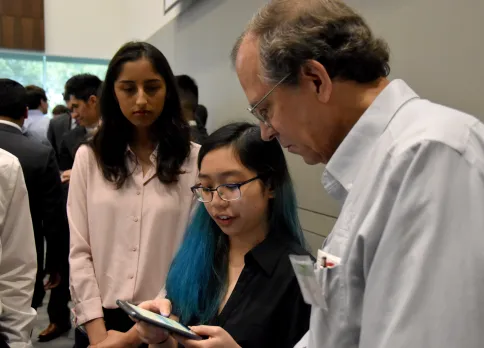
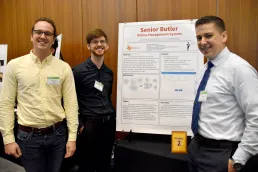
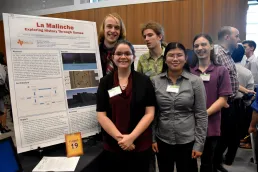
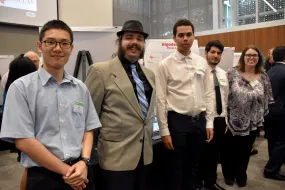
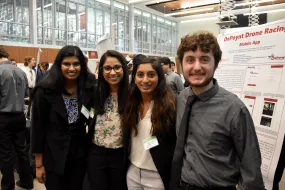
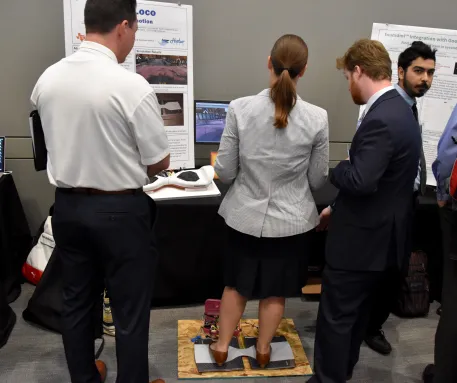
Click here to view all the photos from the Spring’18 UTDesign CS Expo.
ABOUT THE UT DALLAS COMPUTER SCIENCE DEPARTMENT
The UT Dallas Computer Science program is one of the largest Computer Science departments in the United States with over 2,400 bachelors-degree students, more than 1,000 master’s students, 150 Ph.D. students, 53 tenure-track faculty members and 38 full-time senior lecturers, as of Fall 2017. With The University of Texas at Dallas’ unique history of starting as a graduate institution first, the CS Department is built on a legacy of valuing innovative research and providing advanced training for software engineers and computer scientists.




